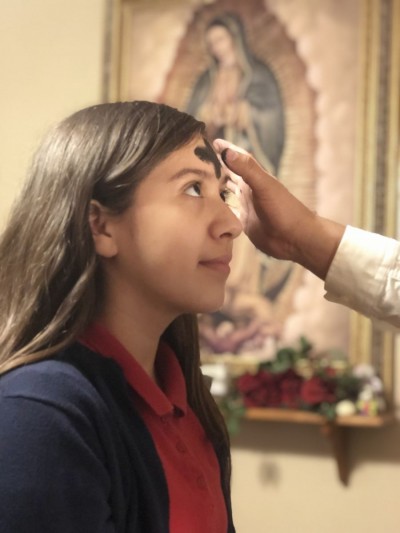
This past Sunday, the last one of Ordinary Time right before Ash Wednesday, we heard a three-pronged message from Jesus regarding the integrity of those who strive to be his disciples. Such integrity is founded on humility and introspection, such as recognizing one’s own blindness, or removing the wooden beam from one’s eye before focusing on the splinter in the brother’s eye. And just as the roots of a fruit tree may need healing in order to bear healthy, good fruit, so may our hearts.
We will be known by the fruit we bear, rooted in our hearts. Anyone who has been a parent of a teenager knows that the approach of “do as I say, not as I do,” carries little weight and inspires not. And this is of course not just with teens. In that sense, if we take seriously that we are called to be disciples of Jesus, to be those who learn from the master and then are sent out to share the Gospel with others; we must first begin with working on ourselves. We must first turn inward; and this begins with true humility.
Lent is a special time that we are given each year to re-order our priorities and to renew our focus on the Gospel of Jesus. We begin it by an act of humbling ourselves, by receiving ashes. The Roman Missal offers two options for the words to be said while the minister places the ashes on the forehead of the faithful. The first is very direct: “Remember you are dust, and to dust you will return.” This option directly connects the symbol with the root origin of the words humility and humble, from the Latin “humus,” meaning “earth.” At its root sense, to be humble then means to literally lower oneself to the ground. The second likewise invites the faithful to humility by recognizing one’s own limitations and faults, and makes a connection with discipleship: “Repent, and believe in the Gospel.”
This lowering ourselves to the ground is not an act of making ourselves feel worthless. This would not make sense, as we do so with our eyes towards salvation and the Resurrection. Jesus did not come to save garbage! The austerity and humility of Lent cannot be separated from the Passion and Resurrection of Jesus. The latter is of course the center of the Gospel of Jesus, which shows us the power of humble love.
Ultimately, humility is central to discipleship because it is in being humble that we can learn from the Master and become like him (as mentioned also in last Sunday’s Gospel). We repent not to stay on the ground, but to be lifted up by the Master, learn from him, and realize our true value in the eyes of God. By believing in the Gospel, we are made strong to go out and announce the Good News, and our words and actions carry more weight as those who practice what they preach. There is something special about those who live the Gospel like they believe it in their core.
Thus, humility is the beginning of true change in our hearts, and in the world around us. True humility takes true strength (that wooden beam sounds quite heavy!). And by going to our core (“heart”) we are able to be made so much stronger. We do this by getting our egos out of the way and letting God’s grace in, such that he can use us as his instruments, oftentimes in ways we never would have imagined.
May the receiving of ashes today be the impetus of our humbling ourselves and turning our hearts more to the hope of the Gospel. If we go down deep, and accept the challenges of this season in prayer, fasting and almsgiving, it will bear good fruit not only in our lives, but in also those around us.
Today, Ash Wednesday, we begin Lent, and we begin this time hearing a call that describes in a clear and convincing way the ideal of Jesus with reference to solidarity with those in need. “When you give alms, do not let your left hand know what your right is doing, so that your alms may be done in secret. And your Father who sees what is done in secret will reward you.”
Proximity to the poor and commitment to alleviating human suffering form part of the essence of Christian thought. Pope Francis continues to emphasize this with words and closeness to the “the least of our brothers”, the ones discarded by the society of success in which we live. The commitment to the poor must be fulfilled through tangible and real actions on behalf of our fellow man, the people around us, and in the world, who suffer from material and spiritual scarcities. We must go further than a theoretical discussion of good intentions.
For years, we, the Community of Saint Paul, have been promoting volunteer work as well as accepting much needed monetary donations in order to be able to accomplish the aid and development projects to which we are committed in Bolivia, Colombia, Mexico, the Dominican Republic and Ethiopia. Volunteer groups come to collaborate in different ways with us: some volunteers work in professional capacities, such as doctors, ophthalmologists and educators. Others bring material goods for those in this world who have the least...the people who fall in the ever widening social gap between the rich and the poor.
However, it is necessary to remind ourselves again and again of Jesus’ teaching that our left hand does not know what our right hand is doing. In a world that relies heavily on social media for communication and measuring results, many people and charitable institutions feel pressured to show what they have achieved as a result of their collaboration or gifts. Photo exhibitions, testimonials and data related to charitable actions generate satisfaction among volunteers and donors for having been able to contribute to change. They calm wounded consciences faced with the flagrant social injustices which we all witness.
As we begin Lent, Jesus challenges us to do good, but... to do it silently, in a discreet way, even anonymously, without the need to show anyone the results that we have achieved. Free selfless assistance doesn’t only benefit the people whom we help. It also teaches us to live the values of humility and discretion. We learn to distance ourselves from the limelight in a world accustomed to exhibiting and recognizing every action that is undertaken, including charitable initiatives. Let’s think about the challenge Jesus presents to us today: can my right hand live without knowing what the left one is doing?
Today, we begin the journey of Lent: 40 days focused on the task of preparing ourselves for the annual Christian feast of Easter. Today, Ash Wednesday, we receive a sign upon our forehead: a bit of ash that reminds us that, according to the ancient story from Genesis, “you are dust and to dust you shall return.” (Genesis 3:19)
This phrase could sound somewhat sad or defeatist, and even antiquated. It reminds us of the biblical punishment to which Adam and Eve were condemned after daring to eat of the fruit from the tree of Good and Evil. We must admit it: none of us like to be reminded that, sooner or later, we will return to the earth from which we came – this is an inevitable destiny for all human beings.
However, today’s ceremony carries a positive message as well. Upon recognizing that we are not eternal, that we cannot avoid the final destiny of our lives, we recognize our contingency, our finiteness, before God, the only absolute.
All human beings tend to “absolutize” someone or something: sometimes we absolutize ourselves, other times we do it to other persons; we absolutize our social role, our activities… Today we remember that we are finite creatures created by an infinite God. The ash on our heads helps us to avoid falling into the narcissistic thinking that no one, nor anything, can limit me, that I am an eternal being.
“You are dust, and to dust you will return”: God reminds Adam and Eve that they – us – are finite creatures, that we are not gods. This is not bad news, for the recognition of our finiteness liberates us to live with joy in the present, the now, instead of selling ourselves to a future that is so often imaginary, for which we are sometimes willing to sacrifice the present, instead of valuing the today and now as a unrepeatable gift that deserves to be lived intensely with full joy and liberty.


